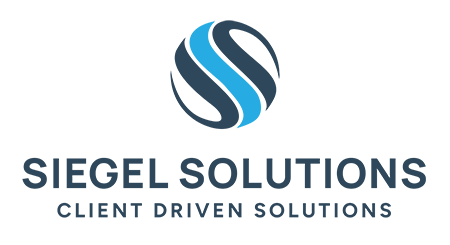09 Aug How to Hire Skilled QuickBooks Bookkeepers

What skills should a bookkeeper possess?
CHOOSING SKILLED QUICKBOOKS BOOKKEEPERS
REQUIRES ASSESSING SKILLS & TECHNOLOGY SAVVY
I’m frequently asked to interview my clients’ prospective bookkeepers because choosing skilled QuickBooks Bookkeepers is challenging. As Siegel Solutions grows, I routinely hire more bookkeepers to meet client demands. If a decision-maker isn’t responsible for completing the kind of tasks their potential bookkeeper will be doing, it can be quite difficult to make a good choice. Frequently the result is an inadequately skilled hire. To complicate matters, most bookkeepers are self-taught or trained by self-taught bookkeepers. Since QuickBooks’ setup is intuitive, it is easy to learn. However, like Othello, it can take years to master. Moreover, even if someone uses QuickBooks and can navigate the software, they might not really be a “Bookkeeper”. Too frequently, QuickBooks users are hired as Bookkeepers when they actually lack significant bookkeeping skill and knowledge.
Here are tips for choosing skilled QuickBooks bookkeepers.
First, you want to determine the requirements of a bookkeeper specifically suited to your business’s demands. For instance, are you only looking for someone to do financial data entry of transactions such as bills, invoices, check payments, customer payments, and payroll? Will they usually just use QuickBooks’ forms? Or, are you seeking someone who in addition to those skills really understands the data? This person is someone who looks at a Balance Sheet or Income Statement and grasps the financial picture. Not all bookkeepers have skill in analyzing financial data and determining its meaning.
Therefore, to discover if a candidate has the skill to understand what your financial data means, show her your QuickBooks File. Then ask her to give you a detailed assessment of it. Make sure that she is digesting the data from a financial perspective. While she begins processing your requests, notice how she navigates QuickBooks. Observe what she focuses on and if she asks relevant questions. Are her comments insightful and pertinent?
What should I find out about bookkeeping candidates?
- Is he moving around QuickBooks with experienced ease and fluidity or does he seem lost?
- Is he looking at the Balance Sheet, Income Statement and other reports? If so, is he asking you about details that stand out?
- If he peruses the Income Statement, is he drilling into the accounts? Is he looking at the statement by month for trends? Or is he pulling up the statement and looking at it with no real focus and initiative. A good bookkeeper will drill into specific accounts and find out how the business is recording transactions. He’ll ask if you have consistent accounts and/or if you have any redundant accounts.
- In the cost of goods sold section, is your candidate investigating if all appropriate expenses are included?
- Is he is looking at the payroll accounts to see if payroll is recorded properly?
- Does he create a comparative YOY Balance Sheet to reveal if accounts are changing adequately?
- Is he pulling up an Accounts Receivable Aging Report to see how old invoices are and if collection issues exist?
How can I resolve these questions?
Firstly, ask prospective new hires to explain how to record non–traditional transactions. Many prospects come to interviews able to create invoices, input vendor bills, pay bills and receive customer payments. Ask them if they can explain how to write-off an invoice, how to create a journal entry, and what they would do if the reconciliation is off. Be specific. Ask how to handle a barter situation, book the purchase of a vehicle, book a new loan, or get rid of a bill that is no longer open.
Secondly, inquire if candidates understand how to dispose of old outstanding checks that should be added back to the bank. Do they know how to pay bills with a credit card, how to account for owner draws, and how to set up an item on an invoice? These types of transactions pop up routinely and unfortunately, some self-professed bookkeepers do not know how to manage them. However, experienced, well-trained bookkeepers with accounting knowledge will.
What else?
Next, investigate your candidates’ accounting knowledge. Frequently, prospective QuickBooks Bookkeepers learn to use QuickBooks and perform bookkeeping tasks specifically based upon the industries and companies for whom they work. And, many bookkeeping roles are transaction-oriented and do not require accounting skills. If you seek a bookkeeper who will ensure that your business’s books are accurate, accounting knowledge is essential. Ask them how they ensure the accuracy of the books on a monthly basis. If they explain that someone else reviews them in their current company, that won’t inspire confidence in their initiative and ownership of those responsibilities. If they reconcile the bank account and or credit card accounts in their present role, ask them what other related accounting responsibilities they perform.
Then, review answers to questions and note if candidates routinely reconcile all transactions. Look for insight and critical thinking beyond mere reconciliation of the bank account. Furthermore, if they regularly review Balance Sheet accounts and Income Statements for accuracy, anomalies, and improperly recorded data, then chances are they have deep, well-rounded experience and skills. However, if they reconcile the bank account, make sure to ask if they review old outstanding checks and deposits. These finer distinctions are important when choosing skilled QuickBooks Bookkeepers. Often, bank reconciliations are completed and indicate that everything balances. Then, if overlooked, old outstanding transactions result in loose ends.
What are some critical questions to ask people’s references?
Pose revealing questions that drill into their skillset and experience.
- What transactions does he enter in QuickBooks? On what timeline? The answers determine when after month-end he can produce a good report.
- Is he responsible for fixing entries and converting data in QuickBooks?
- Is she comfortable printing reports and giving them to a bank?
- Does he send suggestions about improving the books?
- Was she the only QuickBooks user in her most recent company?
Skilled QuickBooks Bookkeepers Invest in Training!
- Is your prospective bookkeeper QuickBooks certified?
- Is his certification current? (There is an annual exam.)
- Is he attending regular webinars or onsite QuickBooks training?
QuickBooks is constantly evolving. For example, it integrates with many 3rd party add-ons that make bookkeeping more efficient, like Bill.com and ReceiptBank. QuickBooks also utilizes bank feeds for banking and credit card downloads
- How technology savvy is a prospective bookkeeper?
- Ask candidates about trends, add-ons, and bank feeds. Then, ask if they keep up with software developments? How do they stay current?
SUMMARY
It is a complex process of assessing whether prospective hires are bonafide bookkeepers. So, separating candidates who are QuickBooks experts from those who merely use QuickBooks helps weed out inexperienced candidates. Therefore, you should test bookkeeping candidates in QuickBooks and pose direct questions to their references. The results clearly indicate their ability, tech-savvy, accounting knowledge, and overall bookkeeping skill. Lastly, if you use these recommendations you can be confident that you’re hiring highly-skilled bookkeepers who are valuable additions to your team.



























